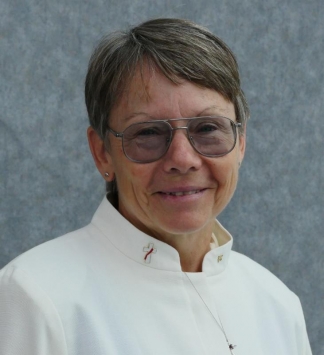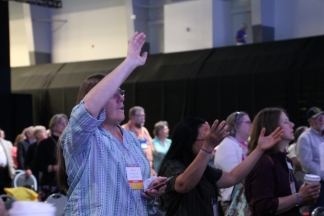news article
What is God inviting you to do?
August 6, 2018 / By Nancy Dibelius, Assistant Director, Spiritual Life for Vital Congregations
Editor’ Note: This article originally appeared in the Summer 2018 issue of the Advocate, which focused on individuals and churches throughout the Upper New York Conference who are boldly living their call. 
Discerning your call is a many-layered, challenging process for most of us. To discern means more than to understand or to make a decision. Discern comes from the Latin discernere; dis means apart, and cernere means to separate. With all the options before us, we “separate apart” those that seem uniquely suited to us. When we are discerning God’s “call” for our life, it requires careful, deep listening, by ourselves and by others who can help us listen.
I have often found the word “call” somewhat intimidating in that it implies to me a clarity that I often find missing. According to Webster’s Unabridged Dictionary, the most common definitions of the word “call” are: to cry out in a loud voice, to command or request to come, to summon, to announce authoritatively. It would have been far more helpful if God had “summoned me authoritatively.” My own experience has been far more like that of Elijah; God comes as the still small voice in the sheer silence. And unlike the commanding voice, a still small voice is often easy to miss or to ignore; it requires silence, attentiveness, a deep desire to listen, and prayerful discernment. For these reasons, I often substitute the word “invitation;” what is God’s invitation for my life?
I often find individuals do not believe that God has an invitation for their life because it didn’t come as a loud voice. For me, the first step is helping persons understand that God has an invitation for all of us. I believe that God rarely “commands” and although he has a desire “uniquely suited to us,” the choice is always ours to make. Part of that choice is that we choose to listen, hear, and allow God into our decision-making process.
So how do we practice discernment? If I am to hear God’s invitation for my life, that requires that I have a close, personal relationship with God and that I practice listening for God regularly. I cannot hope to go away for a weekend, meet God on the “mountaintop” and come home with total clarity about God’s desire for me. I need to learn spiritual disciplines and prayer practices; I need to practice them regularly so that I am making space for the silence and acquiring the ability to hear the still small voice. Part of that discipline is reading scripture; hearing what God is saying to me today in the words I read. Part of that discipline is allowing my faith community to listen with me, to help me understand and process what I believe I am hearing, to help me distinguish God’s desires from my own desires.
The role and importance of a faithful community has always been part of the Christian process of 
Our Wesleyan heritage offers us a clear framework for our discernment process. Does what I am hearing fit with a sound understanding of scripture; does it fit with all that I know about the traditions of our faith; does it make sense in the context of all that I have experienced of God; and is it reasonable/rational within the context of a life of faith. If you and those you consider wise and experienced in your faith community can answer these questions in the affirmative, then you can be confident in what you believe God’s invitation to be for your life. Another test of your discernment over time is whether this invitation bears fruit; how has your response to God’s invitation fulfilled God’s deep desire for your life in the fruit that it produces?
I believe that it is also important to remember what the Christian life is about; being transformed into the likeness of Christ. Transformation is a process; one that I believe never ends. And so we cannot assume that once we believe we have clarity about God’s invitation that that is the end of the story. As we continue to walk with God and respond to God, we must always be listening to God’s invitation for today, for “such a time as this,” and be open to the ways in which God’s invitation is transforming and inviting us to be transformed. “When we persevere and continue to follow the call we’ve heard with our heart, the light grows, and somewhere along the way, we find ourselves exactly where we are supposed to be, doing just what God has called us to do.” 2
References:
1. John of the Cross, The Ascent of Mount Carmel 2. Farrington, Debra, Hearing with the Heart